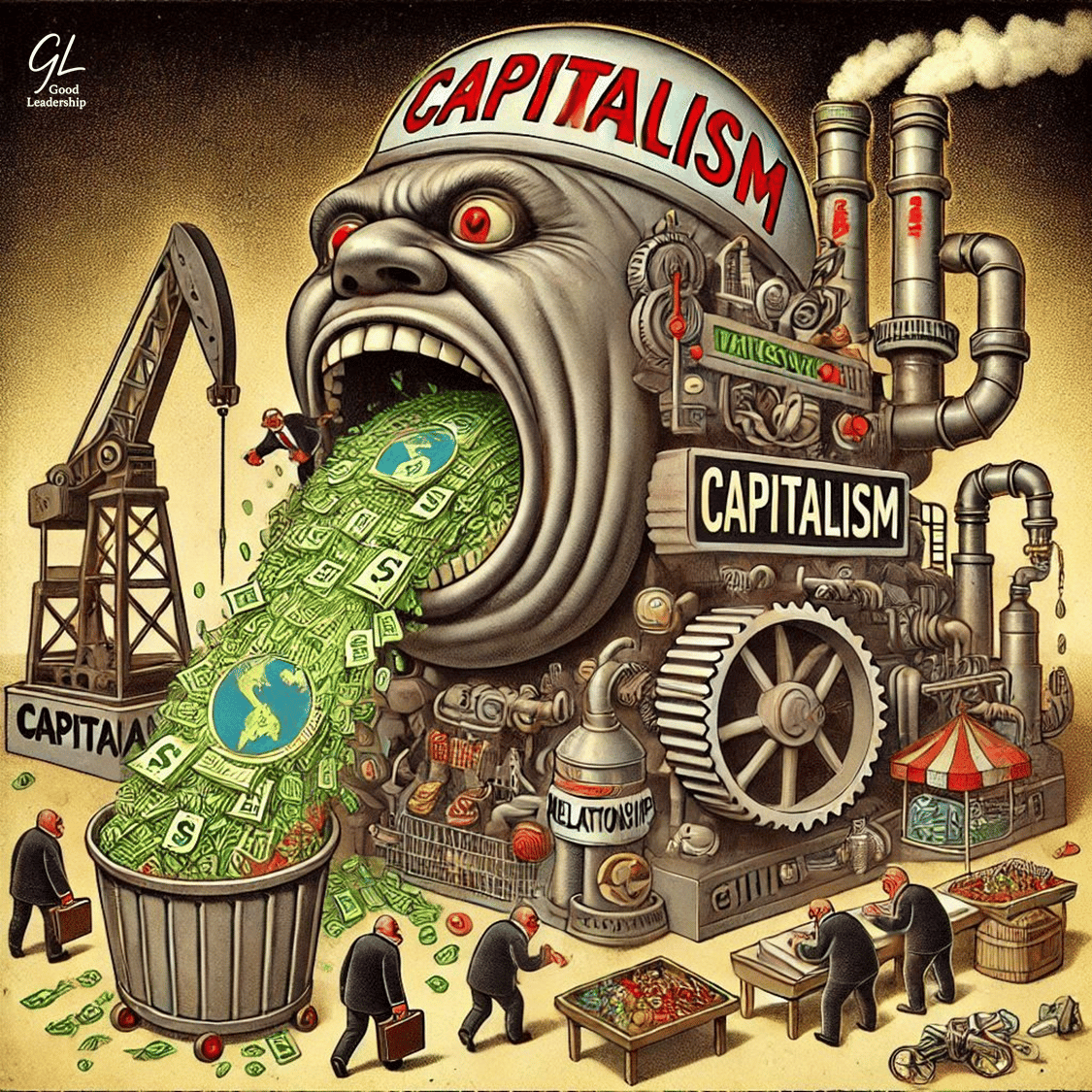
Isn't it fascinating how the phrase "You're a Capitalist!" conjures visions of innovation, ambition, and Elon Musk in a space suit, while "You're a Socialist!" causes instant pearl-clutching? Mention "Degrowther" and you might as well be suggesting humanity abandon electricity altogether.
The kicker? Much of the reverence for capitalism, or outrage at its alternatives, comes from people who haven’t seriously examined how the system actually works. It’s akin to cheering a CEO’s latest bonus while ignoring the shabby warehouses and exploited workers that keep the business running. We’ve become experts at praising capitalism based on its ideological shine or political partisanship, neglecting the messier contradictions within.
But pause a moment: what are we actually defending or criticizing when we invoke “capitalism”? Here, let’s be precise: by capitalism, we mean an economic system where private entities own the means of production and operate them for profit. Key features: private ownership, profit motive, free markets with prices set by supply and demand, wage labour, and competition.
Any fair history admits: this capitalist model has delivered dramatic reductions in absolute poverty, huge leaps in life expectancy, and technological innovation unmatched in history. Defenders like Hayek, Schumpeter, Friedman, Polanyi are right—the system’s dynamism and resilience are remarkable. Even Marx admired capitalism’s creative destruction, even as he foresaw its internal crises. So what’s the problem?
Well, the story is messier than its cheerleaders admit.
What People Think Capitalism Is
A meritocracy where innovation and hard work triumph, embodied by bold entrepreneurs like Musk, Bezos, Jobs.
A system promising democracy and prosperity to everyone willing to pull themselves up by their bootstraps.
The liberator of humanity, sweeping away feudal stagnation with progress and endless possibilities.
An open market where freedom rules, rewarding risk-takers and visionaries.
What Capitalism Also Entails
Hidden costs: unpaid caregivers, resource extraction, and environmental destruction are externalized and uncounted.
The “free market” myth: markets today are shaped by power structures and regulations favouring the wealthy and the Global North.
Freedom sold as equality: yet inequality, alienation, and precarity persist for many, behind the facade of market freedom.
Commodification of relationships: interactions become transactions, eroding trust and community.
Infinite growth obsession: on a finite planet, this drives ecological overshoot and collapse.
Far from the glossy veneer of “liberal democratic capitalism,” material meritocracy, negative freedom, and the pursuit of individual profit often breed greed, exploitation, expropriation, ecological degradation, and the loss of social solidarity and care. Capitalism may deliver good things, but too much of a good thing quickly becomes a bad thing: when freedom and meritocracy run unchecked, they slip into pleonexia—insatiable accumulation—and neglect of the common good. Likewise, socialism risks repressing creativity when equality and solidarity are pursued without restraint. What frightens us about either system is the shadow side unleashed—virtue untethered from values like care, restraint, and justice.
The real question is not who fears the capitalist or the socialist, but what in ourselves we must fear. We should build governance that draws forth humanity’s best, while restraining our worst impulses. “Capitalism” never was a single system, but a family of arrangements: from 19th-century laissez-faire, through Nordic social democracy, to state-backed, tech-driven global capital. Today’s challenge is to learn from different experiences to adapt the system to serve all, or reinvent it for better outcomes.
So why are we so afraid to imagine what comes after capitalism—and what does that fear reveal about the grip of the system on our collective psyche? Is it personal material interests, cultural hegemony, fear of change, or a genuine inability to imagine alternatives? The answer is ambiguous. Fisher is right: “It’s easier to imagine the end of the world than the end of capitalism.” And as Žižek notes, we often act as if we fully believe in capitalism even as we witness its daily contradictions.
The answer is that capitalism has become hegemonic—not just as an economic arrangement, but as a system that reproduces itself through political power, cultural institutions, and ideology. Economic power breeds political and legal structures (Piketty, Pistor), while global capitalism creates a powerful world system—a core-periphery relationships of extraction and unequal exchange (Wallerstein, Hickel). Meanwhile, mainstream economics, business schools, and media—what Mirowski calls “thought collectives”—normalize capitalist logic and marginalize critique, shaping our very sense of what is possible or desirable.
But given where the world is today, we must do better than just believe the soundbites on either side. The Wealth of Nations and The Road To Serfdom might not be exactly beach reads, but perhaps before cheering the next billionaire headed for Mars, we should crack a book—or be honest to ourselves and admit our lazy tendency to equate capitalism with progress and ignore systemic failings.

And let’s face it: most of capitalism’s loudest defenders—posting “inspirational” memes from corner offices—show a lot less courage than those tirelessly revealing its flaws. Before slapping another “support small business” sticker on our Amazon-delivered laptop, let’s always remember that this incredibly convenient system is creating deep suffering for many.
Maybe now I’ll just wait for someone to call me a Keynesian—and see if anyone realizes the real debate isn’t about more state or more market, but whether we have the courage to build a system centered on more humanity.
#Leadership #Philosophy #Transformation #Capitalism #SystemicChange #MythVsReality #PoliticalEconomy #Ecology
